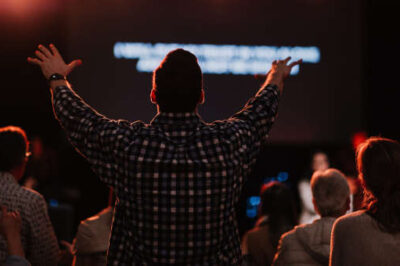When politicians talk about our religious freedom, they often use the phrase “freedom of worship” instead of the First Amendment term, “the free exercise of religion.” Do the specific words matter? Yes, they do.
“Freedom of worship” means you are free to worship inside your church any way you choose. Many politicians, judges and secular-left activists want you to keep your religion behind church doors, where no one else can see or hear it. They don’t want you talking about your faith in the classroom, on campus or in a public park. They don’t want to see you praying or singing Christian songs in front of a government building.
That’s why the precise wording of the First Amendment is so important. It guarantees the free exercise of religion, not just freedom of worship. We are free to exercise our faith at work, on campus, in the neighborhood, on the military base and everywhere else. We do not merely have freedom of worship one day a week. We are free to exercise our religion 24 hours a day, seven days a week. Two recent Supreme Court cases illustrate the importance of the First Amendment guarantee of the free exercise of religion.
First, there’s the case of the cake—Masterpiece Cakeshop Ltd. v. Colorado Civil Rights Commission. In July 2012, a Lakewood, Colorado, baker declined to use his talent to create a custom wedding cake for a same-sex couple, two men. Same-sex marriage, the baker said, violated his Christian beliefs and his conscience. The two men quickly found another baker to make the cake they wanted, but they filed a complaint with the Colorado Civil Rights Commission. The Commission ordered the Christian baker to provide cakes for same-sex marriages, provide antidiscrimination training for his staff and make quarterly reports for two years to the Commission demonstrating his compliance.
The baker refused to comply and instead chose not to make any wedding cakes at all—a decision he says cost him 40 percent of his business. Then he took the Colorado Civil Rights Commission to court, claiming that the Commission had violated his rights to free speech and free exercise of religion under the First Amendment.
The Supreme Court agreed with the baker, ruling seven to two that the Commission had violated his First Amendment rights and had done so out of bias against his religious beliefs. After that ruling, the baker returned to making wedding cakes.
The Supreme Court decision didn’t stop anti-Christian forces from persecuting the Colorado baker. A transgender attorney later filed a civil suit against the baker for refusing to create a “gender-transition birthday cake.” That case remains unresolved as I write these words—but this baker refuses to disobey his conscience or back down from the fight.
Second, there is the case of the Christian crisis pregnancy centers—National Institute of Family and Life Advocates v. Becerra. In California, the 2015 California Reproductive Freedom, Accountability, Comprehensive Care, and Transparency Act (also known as the FACT Act) required Christian crisis pregnancy centers to post notices advertising state-sponsored abortion clinics. Of course, crisis pregnancy centers exist to provide counseling and other assistance so that women can choose not to have an abortion.
Freedom of speech doesn’t merely mean the freedom to speak your mind. It’s also the freedom not to speak a message the government seeks to force on you. The free exercise clause of the First Amendment means that Christians have the freedom not just to worship as they please but also to put their beliefs into daily action.
The Christian crisis pregnancy centers lost their case in the famously far left 9th Circuit Court of Appeals. But in June 2018, the Supreme Court of the United States ruled in a five-to-four decision that California’s FACT Act violated the First Amendment.
Neither of these cases involved the right to worship. Instead, they involved our right to practice our faith and obey our religious conscience in our daily lives. I applaud the example of the Christian baker and the crisis pregnancy centers. At a high cost to themselves, they defended their right to think, believe and behave as Christians in this post-Christian world.
The First Amendment was written to restrain the government from trampling on the human conscience. The government should never tell people what to think or what to believe or what to say. The government should never require people to violate their conscience for any reason. That’s why religious freedom is the first right listed in the First Amendment—and one worth fighting to uphold. {eoa}
Excerpted from Chapter 5 of Hope for This Present Crisis by Michael Youssef (Charisma House, 2021).
Dr. Michael Youssef passionately proclaims uncompromising truth through radio and television programs, the internet and books, periodicals and other resources. Programs are translated and broadcast into 20 languages, covering more than 200 countries.







Leave a Comment
You must be logged in to post a comment.